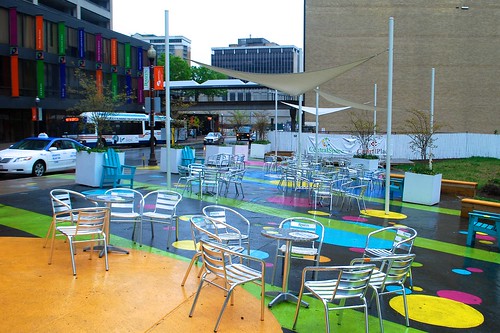 |
| Photo by M.V. Jantzen |
CentralSpace in Rosslyn demonstrates cooperation between developer and local organizations to create a positive community amenity
There's a nice little urban space in Rosslyn that is a good example of how several organizations working together can make a small but positive impact on the urban form. It's called CentralSpace, and it's pictured here. What would typically be a weedy, fenced-in lot awaiting groundbreaking has been transformed into a usable, aesthetically interesting urban space.
Labels:
arlington,
CentralSpace,
JBG,
rosslyn,
urban design,
urban planning
Electricity industry executives are either delusional or math illiterate. You choose.
The consulting firm, Black & Veatch conducts a survey (pdf) of the electricity industry each year, which provides insight into what the industry itself believes is happening and will happen in the future. (Thanks to Grist for bringing this to my attention).
One of the questions and answers in particular caught my attention, because it struck me as being totally absurd. Upon further digging, it turns out I was right; it is absurd.
The question asked of the executives was:
Here is the graph showing how they answered.
One of the questions and answers in particular caught my attention, because it struck me as being totally absurd. Upon further digging, it turns out I was right; it is absurd.
 |
| Nissan Leaf |
The question asked of the executives was:
What proportion of your annual energy load do you expect electric vehicles to represent by the end of each of the following years?
Here is the graph showing how they answered.
When the Mississippi River Finally Wins. Let's Start Planning.
The Mississippi River flooding of 2011 is one of the greatest flood events in the river's history. High water mark records were set in many places along the river, and the US Corps of Engineers has used every trick in its book to reduce the impact on cities. Millions of acres of land have been inundated and economic losses are enormous throughout the basin.
One story that was not as widely disseminated, but needs to be understood is the story about how the Mississippi River reroutes itself every 1000 years or so and is trying to do so again. This article by Thomas Lewis discusses the scenario in great detail.
View New Mississippi River Route in a larger map
One story that was not as widely disseminated, but needs to be understood is the story about how the Mississippi River reroutes itself every 1000 years or so and is trying to do so again. This article by Thomas Lewis discusses the scenario in great detail.
View New Mississippi River Route in a larger map
How is Renewable Energy like Swine Flu?
Recently I visited an old friend of mine, and at one point our discussion turned to climate change and renewable energy. He made the comment that renewables certainly make a lot of sense, but it's "up to the market" to determine their viability. My initial response was that the fossil fuels we have depended on for so long have been getting, and continue to get, subsidies already. So it makes sense to subsidize the renewables. He conceded this point, but I don't think I totally convinced him.
What I didn't tell him, because I thought of it later, is that renewables are more like swine flu vaccine than like a regular marketplace technology.
What I didn't tell him, because I thought of it later, is that renewables are more like swine flu vaccine than like a regular marketplace technology.
Labels:
climate change,
flu,
renewable,
risk
Innovations Towards Zero. Upcoming event at House of Sweden re: electrification and safety in vehicles
9th of June, 2011 ∙ House of Sweden ∙ 2900 K Street, NW ∙ Washington, DC
Join us for a seminar that will focus on the latest findings on safety and electrification of
vehicles and discuss how manufacturers, government and the public can work together to
reduce emissions as well as reduce fatalities and injuries on our roads.
Agenda
Exhibition will include:
Labels:
car,
electricity,
energy efficiency,
safety,
sweden
Subscribe to:
Posts (Atom)





